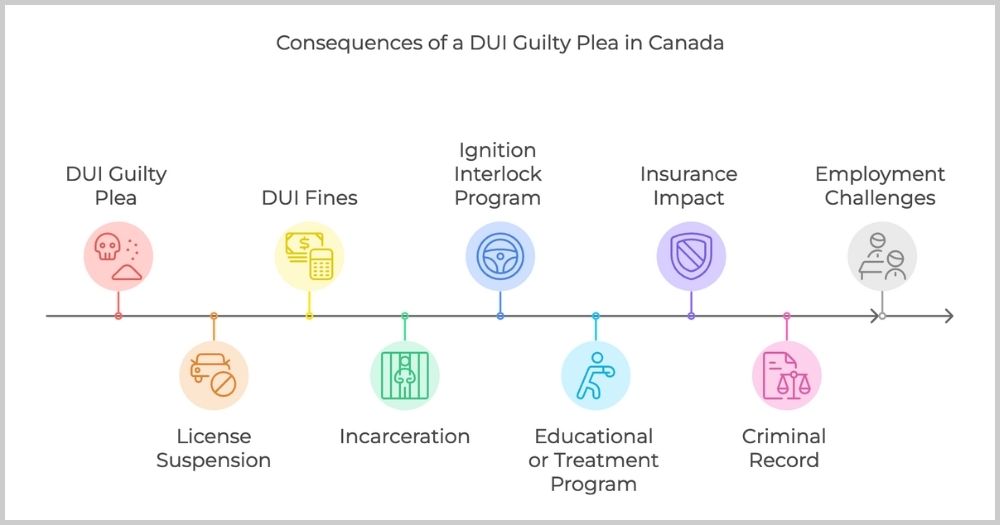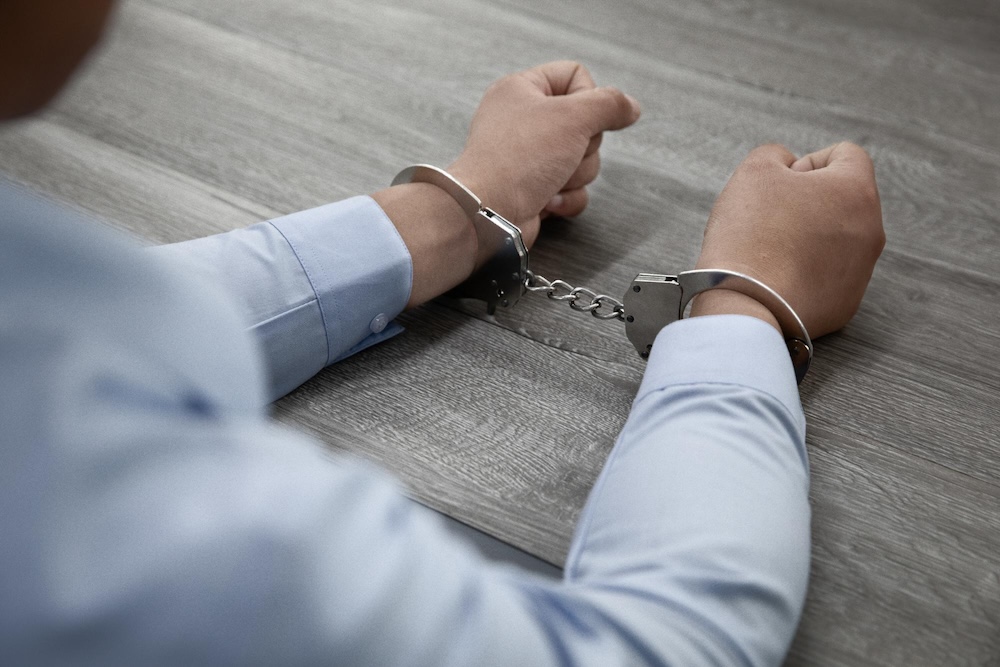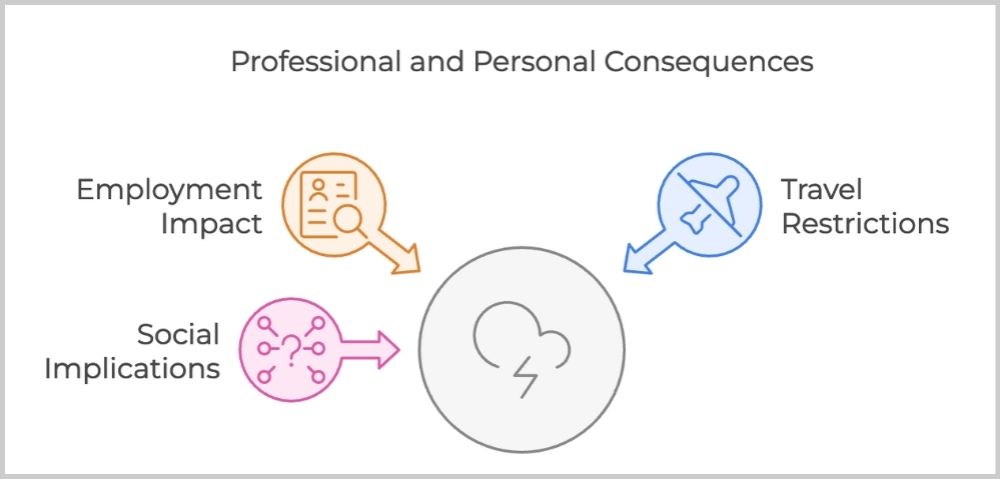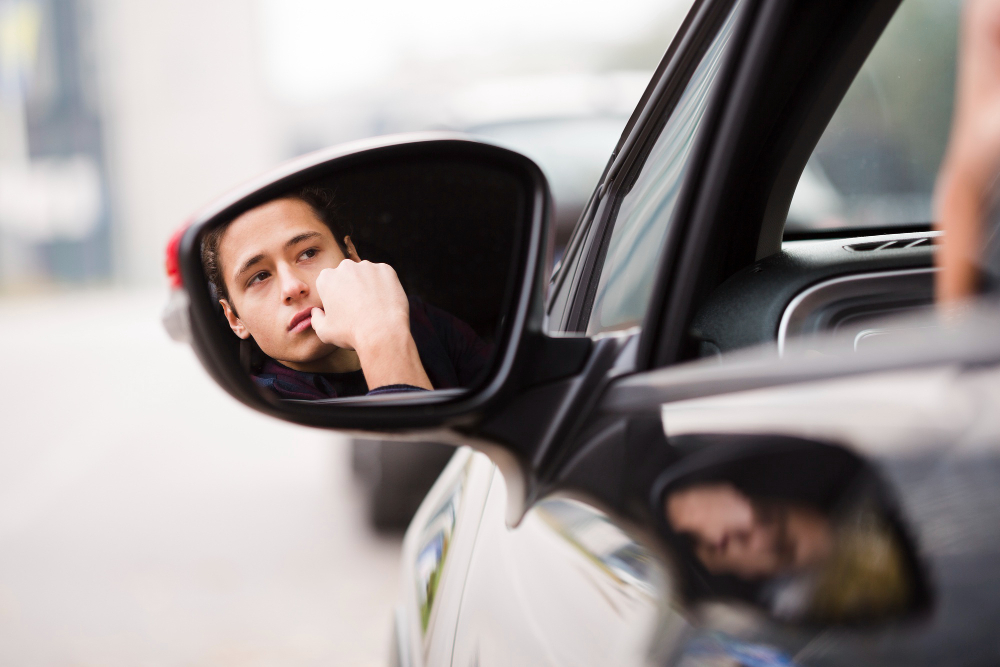The Consequences of Pleading Guilty to DUI in Canada
Last Updated: October 20, 2023
Driving under the influence (DUI) charges are covered under the Criminal Code as well as under the Provincial Highway Traffic Acts. DUI charges are taken very seriously and can have severe life-long consequences. Four main offences are covered under DUI: impaired driving, over 80 mg, refusal to provide a breath or blood sample, and lastly, impaired care and control.
Due to the severity of a DUI charge, being convicted or pleading guilty will result in many penalties.
It is vital that before entering a guilty plea you are aware of what the consequences of it are. Even though you may receive some leniency for entering a guilty plea, you will still be subjected to severe punishments with life-long consequences.
Immediate Legal Consequences of Pleading Guilty
Pleading guilty to a DUI will allow for some leniency in receiving your sentence. However, most of the punishments will remain the same as those convicted of a DUI.

The punishments that you will receive for a guilty plea are further discussed below:
- DUI Licence Suspension in Canada: Your driver’s licence will be suspended for at least 1 year. Depending on if it is a repeat offence or not, the license suspension period may increase. Notably, in some provinces, you may be eligible to gain your licence back sooner, if you enroll in the Ignition Interlock Program. Once the licence suspension period is over, you will be able to apply for a reinstatement, the fee for which will vary from province to province.
- DUI Fines in Canada: For a first-time offence, there is a minimum mandatory fine of $1000. Additional fees may apply if you are a driver under 21 or with a probationary/learner’s licence.
- Incarceration: Depending on the seriousness of the offence and if it is a repeat offence or not, you may be subject to jail time. The length of incarceration varies from a minimum of 30 days (for a second offence) to a maximum of life imprisonment (for impaired driving causing bodily harm).
- Ignition Interlock Program: Following a licence reinstatement, a condition will likely be placed on your licence for a minimum of 1 year (this period can vary from province to province and if it is a repeat offence or not) to only drive a vehicle with an ignition interlock device installed. Drivers will be responsible for all costs associated with the program, the installation, operation, maintenance and de-installation.
- Educational or Treatment Program: Before reinstating your licence, you may be required to enrol in an educational or treatment program, depending on your province. You will be responsible for all costs associated with the program.
- Insurance: After pleading guilty to a DUI, you will be deemed a ‘high risk’ driver for many years, causing your car insurance to drastically increase, with annual premiums being three to five times higher than before your DUI.
- Criminal Record: You will have a permanent criminal record that will affect all areas of your life, from employment to immigration status to the ability to travel.
- Employment: Due to you having a criminal record, it may be challenging to gain and retain employment.
- Immigration: Deportation is a serious and severe consequence that you may face.
- Travel Restrictions: With a criminal record, you may be unable to travel to certain countries.
- Publicity: You may face difficulties in your personal and professional life if the case is reported publicly.
- Probation: You may be subject to a probationary period with specific conditions, even if you are not sentenced to serve jail time.

Long-Term Legal and Financial Consequences
The legal and financial impacts of pleading guilty to a DUI can have negative life-long consequences. The costs of fines, the ignition interlock program, other mandatory educational and rehabilitation programs, higher insurance premiums as well as legal fees can take a negative toll on your life.
Despite being able to apply for a criminal record suspension five years after a summary offence and ten years after an indictable offence, many aspects of your life may already be negatively influenced.
Finding employment or keeping a previous job may be difficult with a criminal record, especially in certain fields that require employees to have no previous convictions. Not being able to find employment can harm your financial status due to the loss of income.
A permanent criminal record can also affect the outcomes of any future legal matters. For example, if you are to repeat a DUI offence, then the Crown may use your previous history as evidence of your inability to learn from past mistakes, so rehabilitation is less likely to be effective and thus you may get a more severe sentence.
Pleading guilty to a DUI will have an impact on your car insurance. Your car insurance provider will have the right to refuse your claims or cancel your policy if you do not disclose your DUI to them. Notably, once you have disclosed your DUI to your insurance provider, they will still have the right to cancel your policy. Should your provider decide to maintain your coverage, it will often be at a higher premium as you will be deemed a ‘high-risk; driver. This will usually look like insurance premiums that are annually three to five times higher.
Professional and Personal Consequences

Impact on Employment Opportunities and Career Progression:
Pleading guilty to a DUI will result in a criminal record. This can have a negative effect on employment. Job options will likely be limited to those who do not require a driving record or background check or those who do not have roles involving driving and public safety.
Current employers upon learning of an employee’s DUI will employ certain measures in accordance with the company’s ethical guidelines and policies. This can include the issuance of a warning, suspension or under certain conditions termination.
To mitigate the consequences of a DUI criminal record in Canada, it is important to have early disclosure and take on personal responsibility towards sobriety. Even though it may be difficult to secure employment, more so in specific fields, Canadian laws prevent anyone from being discriminated against or treated unfairly on the sole basis of having a criminal record.
Travel and Immigration Restrictions:
DUI is taken very seriously both in Canada and outside of it. Having a criminal record can impact your eligibility to travel to some countries such as the United States as they can see if a Canadian has a DUI record.
Furthermore, having a DUI criminal record in Canada can impact your immigration status. If you are a permanent resident in Canada, then you can lose your status and potentially face deportation.
Social and Personal Implications:
Dealing with a DUI charge can be a very stressful process. Pleading guilty to a DUI in Canada can have a negative impact on your social and personal life. A shift may be seen in how individuals view you which impacts your reputation. Due to this shift in reputation, a shift may also be seen in how the community treats you thus limiting your community involvement. The stress of the DUI alongside the stress of dealing with the consequences, such as loss of income due to loss of employment, can result in major emotional and psychological impacts. This in turn can cause strains between your relationships with those that are close to you.
Alternatives to Pleading Guilty
Pleading guilty is not your only option.
Depending on the specific circumstances surrounding your case and the particular facts of the case you may be able to negotiate for a dismissal of the charges or alternative resolutions. Pleading not guilty and going to trial is also a viable option which will require a strategic defence strategy to aid in beating the DUI charge. The best defences will be those that are tailored to your specific case, however below are potential defences that can be used to beat a DUI charge:
- Challenging the Legality of the Stop: This defence is centred on determining if the police had a valid reason to stop your vehicle. Reasons for a stop can include investigating impaired driving, licensing, insurance or vehicle fitness.
- Questioning the Validity of Test Results: Reasons such as medical conditions may be the basis for failing a field sobriety test. This defence can also take the form of if the testing equipment or screening devices were faulty at the time of use or if they were operated incorrectly thus resulting in inaccurate readings.
- Necessity: In some cases where the passenger was at risk of harm, then this defence may be applicable. This defence is reliant on the basis that there was no other legal alternative and that the distance driven was only that which was necessary to get the required help.
- Breach of Charter Rights: This defence can get some if not all of the evidence against you excluded as per s.24(2) of the Charter. If the police are to violate any of your Charter rights and freedoms during investigations, or before or after your arrest then this defence may be applicable.
Role of a DUI Lawyer in Navigating DUI Charges
An experienced DUI lawyer will be able to help you navigate through legal processes. They will be able to analyse the Prosecutor’s evidence against you, assessing for any weaknesses to aid in developing a strategic defence strategy. A diligent lawyer will also work with Crown Prosecutors to seek a resolution or alternative sentencing that is in your best interest. Should your case proceed to trial then our DUI lawyers will work to develop a strategic defence strategy utilising all possible defences as well as taking all other necessary steps to mitigate the life-long consequences of a DUI conviction.

Frequently Asked Questions About DUI Charges in Windsor
Will pleading guilty to a DUI result in a criminal record?
Yes, pleading guilty to a DUI will result in a criminal record. There are many other alternatives to pleading guilty. You can discuss your options with one of our experienced DUI lawyers who will be able to help you decide what the best legal strategy is for you to pursue.
How will a DUI conviction impact my car insurance rates?
A DUI conviction will result in you being deemed a “high-risk” driver. This means that your insurance premiums will likely be three to five times higher annually.
Can pleading guilty to a DUI affect my employment or job prospects?
Since pleading guilty to a DUI will result in a criminal record you may face difficulties in receiving employment. It may be difficult to secure employment in specific fields that require a background check or a driving record.
Depending on company ethical guidelines and policies, a current employer may choose to issue a warning, suspension or even termination in certain circumstances.
Are there any immigration or travel restrictions after a DUI conviction?
After a DUI conviction, your immigration status may be jeopardised and you could even be deported.
Your ability to travel will also be impacted. Some countries like the United States have access to see if a Canadian has a DUI conviction so they may refuse you entry into their country.
Can a DUI conviction be removed from my record in Canada?
You will be able to apply for a criminal record suspension or a DUI pardon either five years after the offence if pursued summarily, or ten years after an indictable offence. However, you will have already faced most of the DUI penalties Canada. For further information, speak to one of our experienced lawyers.
Are there any alternatives to pleading guilty to a DUI?
Yes, there are many alternatives to pleading guilty to a DUI. You can negotiate for a dismissal of the charge as well as other resolutions. If you plead not guilty to go to trial, you will have numerous defences available to you. For guidance on what path is best for you speak to one of our experienced DUI lawyers.
Conclusion
DUI penalties are very severe. Pleading guilty to a DUI will have an impact on all aspects of your life from financial strains to tension in personal relationships as well as restrictions on all areas of your life. You will face driving suspensions, fines, higher insurance rates, enrolling in educational programs and having a criminal record. Throughout it all, the resulting stress will take a social and emotional toll on your life.
It is important for you to understand that the consequences of a DUI conviction are life-long. Before you decide to plead guilty DUI in Canada, it is imperative that you seek legal advice from one of our experienced DUI lawyers who will be able to help you safeguard your future from the repercussions of a guilty plea.
Get A Free Consultation
"*" indicates required fields



